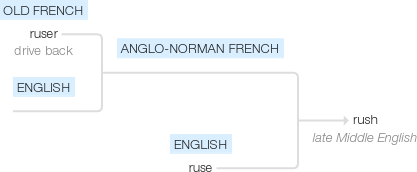Rush
late Middle English: from an Anglo-Norman French variant of Old French ruser ‘drive back’, an early sense of the word in English (see ruse).
wiktionary
From Middle English risshe, rusch, risch, from Old English rysċ, rysċe, risċ, risċe, from a merger of Proto-West Germanic *riskijā, from Proto-Indo-European *resg-(“to weave”) and Proto-West Germanic *ruskijā, borrowed from Latin rūscum(“butcher's broom”), of unknown origin + *-jā(animal and plant suffix). Cognates include West Frisian risk, Dutch rus(“bulrush”), Norwegian Bokmål rusk, dialectal Norwegian ryskje(“hair-grass”).
Perhaps from Middle English ruschen, russchen(“to rush, startle, make a loud rushing noise”), from Old English hrysċan(“to jolt, startle”), from Proto-Germanic *hurskijaną(“to startle, drive”), from *hurskaz(“fast, rapid, quick”), from Proto-Indo-European *ḱers-(“to run, hurry”).
Cognate with Old High German hurscan(“to speed, accelerate”), Old English horsc(“quick, quick-witted, clever”).
etymonline
rush (v.)
mid-14c. (implied in rushing), "to drive back or down," from Anglo-French russher, from Old French ruser "to dodge, repel," which is from Latin recusare"make an objection against; decline, refuse, reject; be reluctant to" (see recuse; also compare ruse).
The meaning "do something quickly" is from 1650s, hence "to move or act with undue eagerness or without deliberation or preparation;" the transitive sense of "to hurry up (someone or something), cause to go swiftly" is from 1850. The sporting sense in U.S. football originally was in rugby (1857).
The fraternity/sorority sense is by 1896 (originally it was what the fraternity did to the student); from 1899 as a noun in this sense, "entertainment for prospective pledges." Earlier it was a name on U.S. campuses for tests of strength or athletic skill between freshmen and sophomores as classes (1860).
rush (n.1)
"plant growing in marshy ground," Old English resc, earlier risc, from Proto-Germanic *rusk- (source also of Middle Low German rusch, Middle High German rusch, German Rausch, West Frisian risk, Dutch rusch), from PIE *rezg- "to plait, weave, wind" (source also of Latin restis "cord, rope").
Old French rusche probably is from a Germanic source. Used for making torches and finger rings, also strewn on floors when visitors arrived; it was attested a type of "something of no value" from c. 1300. See OED for spelling variations.
rush (n.2)
"a hasty driving forward, a tumultuous charge," late 14c., from rush (v.). Sense of "mass migration of people" (especially to a gold field) is from 1848, American English, in reference to California. The football/rugby sense is by 1857. The meaning "surge of pleasure" is from 1960s.
Rush hour is recorded by 1888. Rush order, one for goods required in a hurry, is from 1896. The sense in rush of business (1849), etc. is "extreme urgency of affairs."
